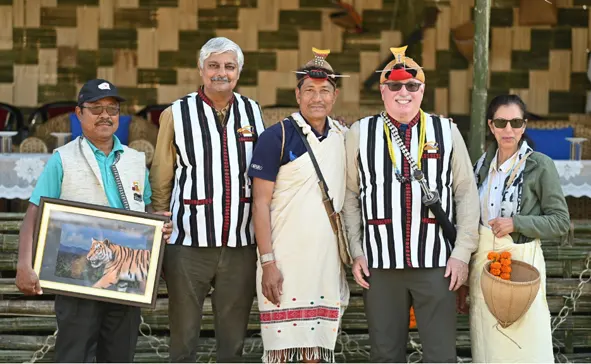ITANAGAR, 19 Dec: Wildlife Trust of India (WTI) and the International Fund for Animal Welfare (IFAW) celebrate a milestone achievement of 20 years of dedicated service to wildlife conservation with community members from Pakke Tiger Reserve, and the department of environment & forest, Arunachal Pradesh.
Hosted at the VKV Alumni Children Park (Pakke Paga Hornbill playground), the event involved interactions with elders from the Nyishi Elite Society, the Aka Welfare Society and the Gora Aabhe, who have helped preserve the forests and wildlife in this region.
WTI-IFAW have been working in the Pakke landscape for nearly two decades in collaboration with the department of environment & forest, Arunachal Pradesh, the International Fund for Animal Welfare and Indigenous Communities. In 2002, they jointly established the Centre for Bear Rehabilitation and Conservation (CBRC) in Pakke Wildlife Sanctuary and Tiger Reserve. This year also marks 25 years of WTI’s conservation journey in India since its inception in 1998.
CBRC is the first specialized rehabilitation centre for Asiatic black bears in India, where a team of dedicated veterinarians and staff provides shelter, food and veterinary care to cubs that have been orphaned or displaced due to habitat destruction and human-wildlife conflict, with the aim of eventual wild rehabilitation. Over 50 orphaned Asiatic black bear cubs have been successfully reintroduced into the wild, to date. Additionally, the team has assisted the state forest department in the rescue and translocation of 35 Gibbons and the rehabilitation and release of 107 other wild animals in Arunachal Pradesh.
Azzedine Downes, president and CEO of IFAW, said, “Recognising the vital role of indigenous people in preserving forest biodiversity, our core belief is that both animals and humans can thrive together on this planet. Our commitment extends beyond wildlife conservation to ensuring the safety of communities living alongside wildlife. The 25 years of service to nature is a significant milestone for WTI-IFAW and this would not have been possible without the engagement of the community, the forest officers, and all those who sacrificed their lives in the line of duty.”
Vivek Menon, founder and executive director, WTI, said, “WTI selected the Pakke landscape as one of our initial projects over two decades ago due to its rich biodiversity and over the years, we’ve witnessed a remarkable transformation. Today, CBRC has a 90% success rate in rehabilitation, one of the highest in the world. This success showcases the feasibility of releasing Asiatic black bears into the wild and positions Pakke as a top-performing tiger reserve in India. Furthermore, our collaborative work with the community highlights that civil society and the forest department can come together and work as one front to attain significant conservation goals.”
N.Tam, PCCF (WL&BD) & CWLW govt. of Arunachal Pradesh, noted the substantial decrease in illegal hunting in the forests over the years. This positive change is attributed to the collaborative efforts of WTI-IFAW, the forest department, and local communities. He also expressed appreciation for the initiatives aimed at supporting the local community.
“Through their Pakke conservation project, WTI-IFAW has not only safeguarded hornbills and wildlife in these forests but also supported the indigenous community, recognizing our interconnected fate with nature,” expressed Katung Waghe, president of the Indigenous Faith and Cultural Society of Arunachal Pradesh.
Takam Nabam, chairman of Ghora Aabhe Society, Seijosa, provided a brief history of conservation activities.
In honour of the fallen wildlife rangers in Pakke Tiger Reserve, a poignant one-minute silence was observed during the programme.



